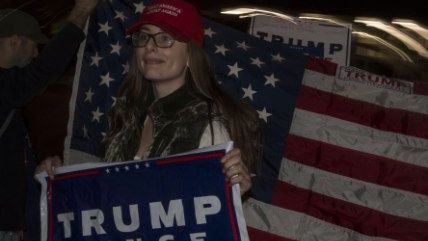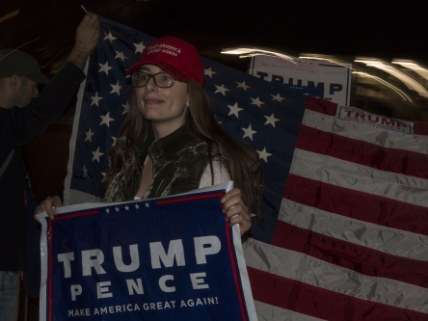Trump and the Media's Alleged 'Failure'
There was actually plenty of news coverage of the views of Trump supporters.


Terry Brown is a 55-year-old plumber in Stanley, North Carolina, a small town that is 90 percent white and whose motto is "Jesus Saves." He is the sort of person media elites and coastal liberals allegedly overlooked or scorned before Donald Trump's surprise victory.
These arrogant sophisticates, we are told, live in a world of people just like themselves, making them incapable of understanding the real America. So Trump's victory hit them like a lightning bolt out of a clear blue sky.
Brown, however, was not surprised. "I don't know anyone who would vote for Hillary Clinton," he told Los Angeles Times reporter Jenny Jarvie the day after the election.
He doesn't know anyone who would vote for Clinton? That's quite a feat, because 60.5 million of his fellow Americans did. Apparently, there are Trump voters who live in their own bubbles—distant from and deaf to ordinary people who think differently.
On Tuesday, analysts reported, the outcome was determined largely by a surge of support from whites who didn't go to college and live in rural counties, particularly in New Hampshire, Pennsylvania, Ohio, Michigan and Wisconsin. The media and Democrats were blamed for not expecting as much.
The ensuing condemnations implied that Jake Tapper knew less about Toledo than he does about Tanzania. Rod Dreher of The American Conservative accused the news media of "forgetting that (they) ever knew people like the white working-class and rural people of the Rust Belt." Piers Morgan congratulated himself in the Daily Mail for writing last year, "Trump has a big popular appeal away from the snobby halls of Washington and New York's media elite. Regular Americans love the guy."
If the media assumed Clinton would win, it was not because reporters forgot that there were people who favored Trump. There was an endless supply of stories featuring interviews with them. Each of his rallies drew throngs of journalists—who might have done a better job of learning the views of Trump supporters if the campaign had not confined the press to areas separate from the rest of the audience.
When Morgan says "regular Americans" love Trump, he's using the term in an odd way. It's worth noting that Trump didn't even get more votes than Clinton, who beat him by nearly 400,000 votes nationally. You can't get as many votes as she did without attracting at least a few ordinary folks.
Nor did Trump capture the working class. Among voters with incomes between $30,000 and $50,000 a year, Clinton beat him by 9 points. But when Morgan refers to "regular Americans," he obviously means "white Americans." Working-class blacks and small-town Hispanics are irregular and thus irrelevant.
It never occurs to the media-bashers that rural white blue-collar guys may be insulated from real Americans, a lot of whom live in big cities. Metropolitan New York alone has 18 million people—more than Wisconsin, Michigan and New Hampshire combined.
Marathon County, an industrial area in north central Wisconsin that Trump won easily, is 0.8 percent African-American and 2.7 percent Hispanic. Manhattan is 18 percent black and 26 percent Latino. New York and other urban areas have just as much claim to be the home of real Americans as any Midwestern town.
If the media failed to foresee the election outcome, it's not because they weren't paying attention. It was partly because they relied on the most comprehensive information available—national and state polls.
Public opinion surveys had shown Trump leading his Republican rivals during the primaries, and they proved accurate. In the general election campaign, polls consistently showed Clinton leading the race both nationally and in most battleground states. Most Republican politicians and consultants expected Trump to lose.
Had the polls shown Trump ahead, week after week, journalists would have expected him to win. Their failure was the product of data, not ideology.
If the media made a mistake, it was assuming that voters would judge Trump by the same standards applied to past candidates. He repeatedly found himself generating unwanted attention and pointless controversy, of the sort normal politicians would never risk. It was surprising to see him do it, and it was surprising to see him get away with it.
With polls in hand, the media concluded that the electorate, including working-class white men in small towns, had seen through Trump. That was the ultimate media failure: not expecting too little of these voters but expecting too much.
© Copyright 2016 by Creators Syndicate Inc.


Show Comments (168)